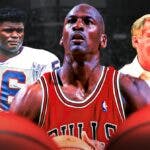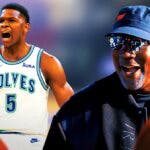During a recent radio show with Dan Sheldon of NBC Sports Northwest, former NBA big man Channing Frye said that Michael Jordan would not be as dominant in today's game.
“He only had really one job. And that was to just score,” Frye said. “And he did that at an amazing, amazing rate. But I don’t feel like his way of winning then would translate to what it is now.”
Frye went on to say that guys would not want to play with Michael Jordan (for whatever reason) and that Jordan would have to “adjust and adapt.”
Given that Frye is very close with his former Cleveland Cavaliers teammate LeBron James, it's not surprising that Frye—who thinks James is the greatest player to ever step on the court—would try to diminish Jordan.
But Frye's attempts at knocking Michael Jordan down a peg here are pretty ridiculous.
First and foremost, saying that Michael Jordan only had “one job” and that it was “to just score” is flat out wrong. In addition to his lifetime average of 30.1 points per game, the GOAT also registered 6.2 rebounds, 5.3 assists and 2.3 steals a night.
He won a Defensive Player of the Year award. He made All-Defensive Teams nine times. He even had a season where he averaged eight assists per game.
But somehow, Frye thinks that Michael Jordan's only job was “to just score.”
Yes, Michael Jordan is certainly most known for his insane scoring ability, but he was also a terrific passer, a good rebounder and a truly elite defender. He literally did it all.
And let's remember that Jordan was regularly averaging over 30 points per game in an NBA landscape where defenses were much more physical. Hand-checking was allowed. Much more contact was permitted in general. Flagrant fouls were not called as frequently as they are today.
Would Michael Jordan average 50 in the modern era? No, but if James Harden can average 36, then Jordan can do at least that and probably around 40.
The assertion that Jordan's lack of a three-point shot would hurt him is also nothing more than conjecture.
Michael Jordan developed into a reliable perimeter shooter later in his career, making 42.7 percent of his triples in 1995-96 and 37.4 percent of them in 1996-97.
No, he wasn't Reggie Miller, but the idea that MJ would be DeMar DeRozan in 2020 is beyond asinine.
We are talking about one of the hardest-working athletes in history here. You don't think that Jordan wouldn't be working tirelessly on his three-point shot if he were playing today?
The triple was not a big part of offenses back in Jordan's era, which was why guys like Miller and Mitch Richmond were so unique at that time.
But if Michael Jordan were playing in today's game, there is zero doubt in my mind that he would have been getting up thousands of threes a day in practice until he became a knockdown three-point shooter. The fact that he had a few years where he made them at a really solid rate back in the '90s is proof enough that he could have been a good long-range shooter in the modern era.
Now that we got the fact that Michael Jordan was a dominant all-around force—not just a scorer—and that he surely would have been draining treys in 2020, let's move on to Frye's claim that people would not want to play with him.
Uh, how does Frye know this?
If players aren't complaining about Harden, the most iso-centric player in the league, why would they not want to play with Jordan?
Perhaps some guys would be intimidated by Michael Jordan and would not want to incur his wrath on a daily basis. That I could see. But not wanting to team up with him because of his play style?
Would Frye have hated playing with LeBron had he arrived in Cleveland a year earlier in 2015, when James fired up 32.7 shots per game during the finals and made just 39.8 percent of them while posting a true-shooting percentage of 47.7 percent?
Michael Jordan won six championships. He went 6-0 in the finals without even going to a Game 7. Players like winning, so I have a hard time believing that fellow stars today would just say, “Yeah, I don't want to play with MJ because he scores too much.”
If anything, Michael Jordan would be even more dominant in 2020. He wouldn't have Gary Payton and other physical guards hand-checking him on the perimeter. He wouldn't have Bill Laimbeer, Rick Mahorn, Charles Oakley and Anthony Mason putting him on his butt. And in a faster-paced system? He would be able to get that many more opportunities.
Let's be real here: Frye's erroneous analysis is more about building up James than anything else. A deeper, more honest and impartial look into Jordan's career will tell you that he was much more than “just” a scorer and that he wasn't DeMar DeRozan.




